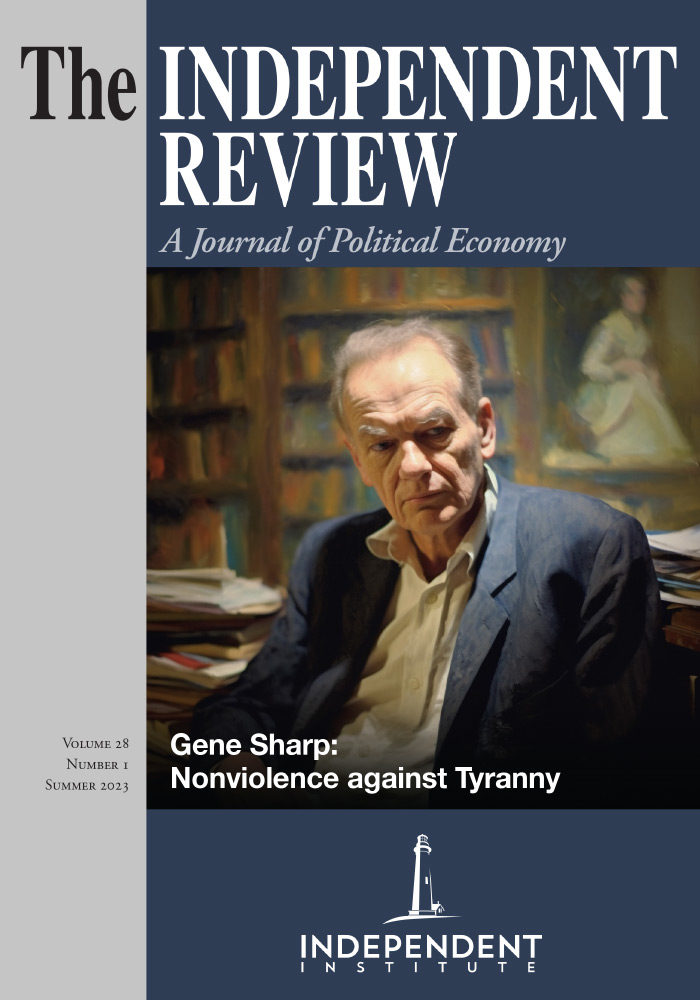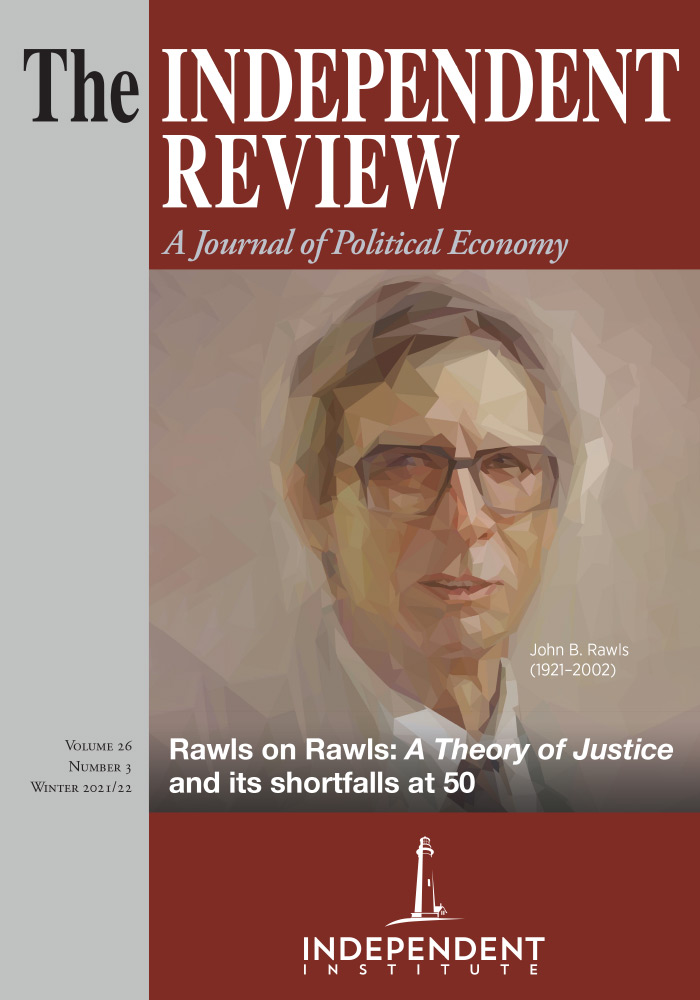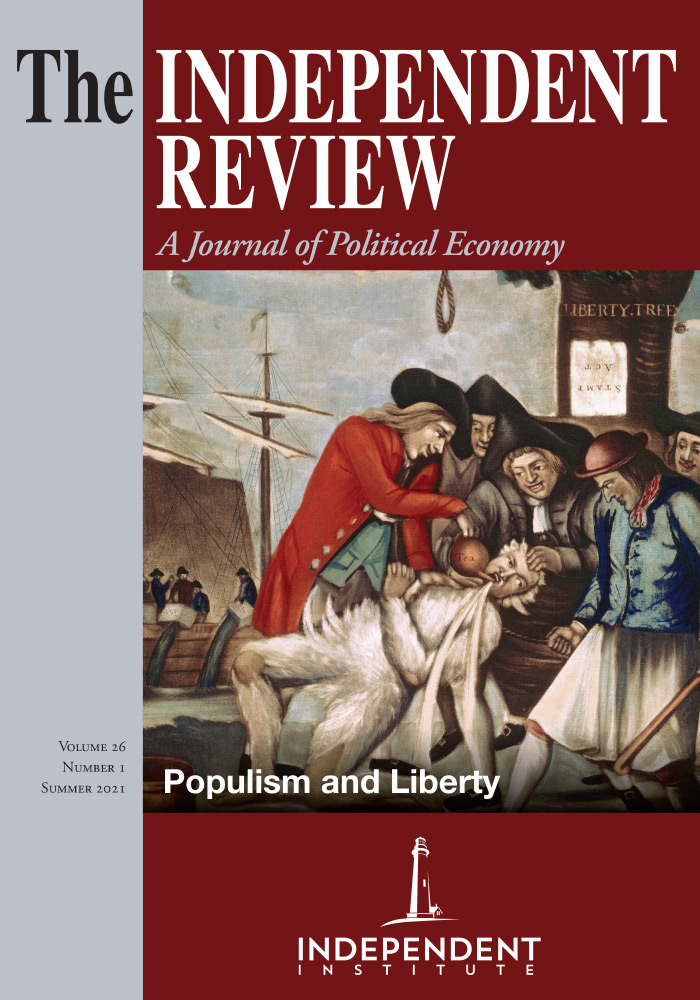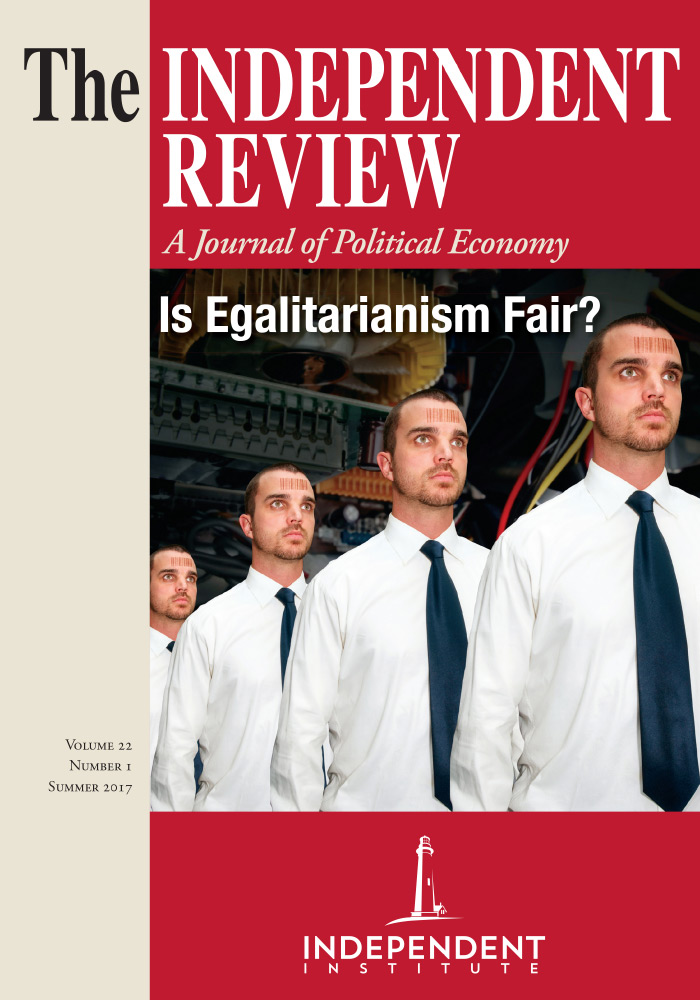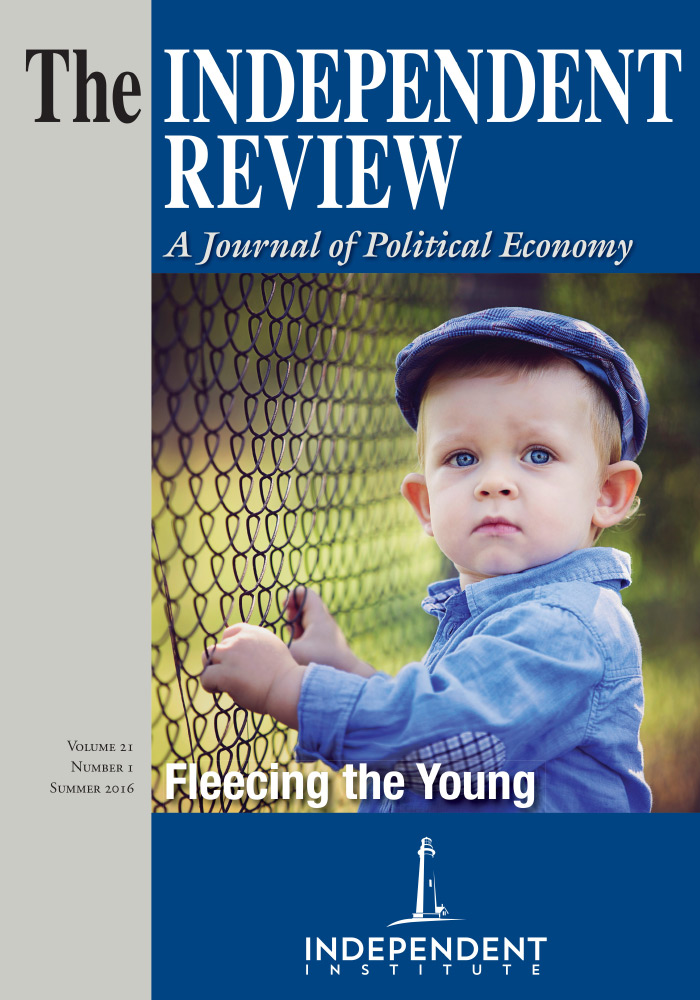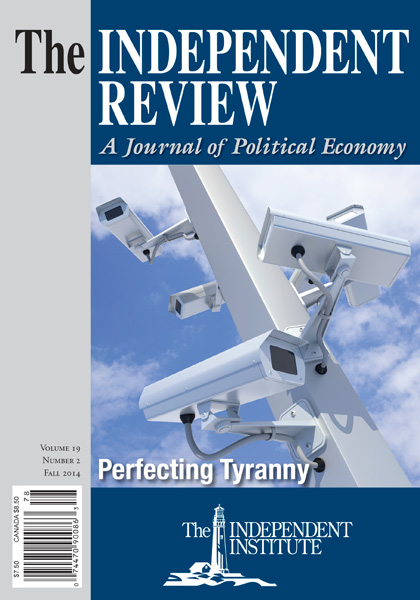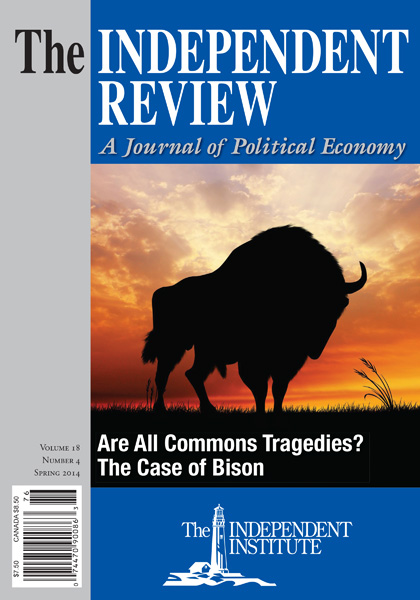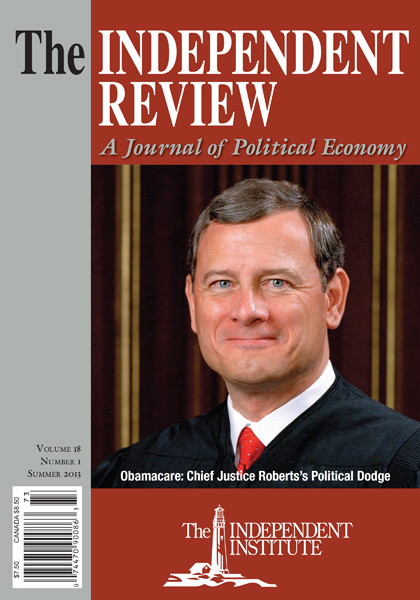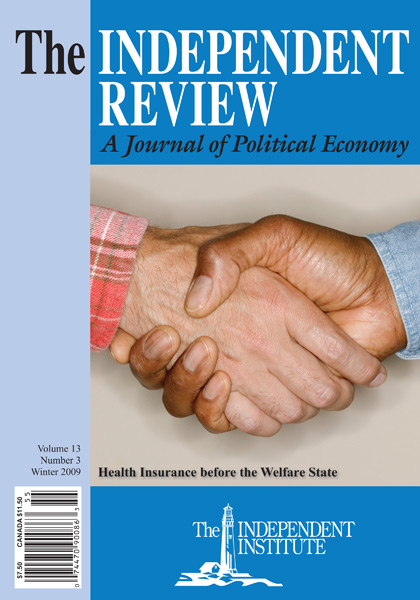This year marks the 300th anniversary of Adam Smith’s birth. In this paper, Nobel laureate Vernon Smith examines the earlier Smith’s The Theory of Moral Sentiments, a treatise on psychology, and his path-breaking work in economics, The Wealth of Nations, showing that both are foundational in understanding how the West grew rich because of its commitment to classical liberalism anchored in freedom.
Article
Adam Smith’s The Theory of Moral Sentiments ([1759] 1853; hereafter TMS), a treatise on psychology, preceded his foundational work in economics, An Inquiry into the Nature and Causes of the Wealth of Nations Smith ([1776] 1904; hereafter WN). His second great book would subsequently overshadow his first great book. Both, however, are foundational in understanding how the West grew rich because of its commitment to classical liberalism anchored in freedom.
Sentiments and the Origins of Human Sociality
Smith’s psychology was social. Thus, in his incisive mental experiment, if we were to imagine a member of the human species growing up in complete isolation from others, she could not know any more about what it means for her mind to be deformed than for her face to be deformed. Bring her up in society, and she is supplied with the mirror she needs to know these things (TMS, 162).
Smith modeled human social relationships at their root in human sentiment, particularly in the human capacity for mutual fellow-feeling, which enables us simultaneously to form an image of each other as an integral part of defining our relationships. In our earliest interactions with others, we find that their actions are sometimes pleasing and sometimes hurtful to us, and this leads us to form judgments concerning their conduct. Similarly, we learn that our actions have like effects on them. In this process, we gradually learn to see ourselves as others see us, and “to examine our own conduct as we imagine any other fair and impartial spectator would examine it” (TMS, 162). In this quotation, it is essential for modern scholars to read fair in its eighteenth-century meaning as “fair play”—the sports metaphor distinguished its meaning then from its modern reference to distributional outcomes. There was no word unfair; the opposite of fair was foul, a concept born into the heart of injustice in classical liberalism. Indeed, fair was a unique English word without translation into any other language. Other languages such as German and Polish simply adopted the English fair (Wierzbicka, 2006).
Still a third perspective is our ability to examine our conduct shorn of a tie only to me or to you: “To be amiable and to be meritorious; that is, to deserve love and to deserve reward, are the great characters of virtue; and to be odious and punishable, of vice. But all these characters have an immediate reference to the sentiments of others. Virtue is ... amiable, or ... meritorious ... because it excites those sentiments in other men” (TMS, 165). Our personal experiences, those of others, and the rules we learn become societal norms. In Smith’s model of community, modern liberal notions of “individual responsibility” were manifest in “self-command,” a trait that individuals acquired in growing up and as they drew strength and empowerment from the matrix of social connectedness (TMS, 203–7; 213–16). As John Donne, one of Smith’s seventeenth-century forerunners, proclaimed: “No man is an island entire of itself.” Neither is he a collectivist.
Classical Liberalism and the Rule of Law
This essay will focus on Smith’s two propositions on justice—actually, on injustice, because, as we will articulate, Smith’s justice was defined negatively as the residual set of actions not expressly prohibited. These propositions constitute the foundation of classical liberalism, which became known loosely as “the rule of law.” That tradition was the intellectual correlate of the take-off in economic growth from its origins in Northern Europe, moving west with the great migrations associated with British colonialism, and its aftermath. These traditions survive most prominently today in various forms, including the philosophical and political economy movement known as libertarianism.
According to TMS there are two pillars of society—beneficence and justice. Both are important in understanding human society. Beneficence is at the center of our good offices toward each other, and we will return to it in its proper order, when we revisit WN in the light of TMS. Justice, however, is far more critical to society in the sense that a society of people ready at all times to act hurtfully toward others will “crumble into atoms,” and cannot survive (TMS, 124–25). Smith’s injustice propositions well illustrate his model of sociality in showing how human rule-following conduct evolves to serve the stability and effectiveness of society.
Smith’s first injustice proposition asserts that intentional actions of a hurtful tendency alone deserve punishment, because such actions alone are the (socially) approved objects of resentment (TMS, 112). In its elaboration, Smith adds the corollary that resentment and therefore punishment is proportional to the hurtfulness of the action (TMS, 121).
Hence, limiting and controlling injustice arose by the ancient processes of consent (“approbation”) at work in human history long before the arrival of civil government, wherein it was natural to codify that long experience into rule-of-law regimes. Think of Moses, and the Ten Commandments emerging unaccountably and insensibly out of Jewish culture and experience, and thus being perceived as having emanated from God on a mountaintop.
Other Regarding Rules from Common Knowledge of Self-Interest
Smith followed the Stoics in asserting that all of us are strictly self-interested; in modern language, always preferring more, and dis-preferring less, of any non-satiating resource such as money as command over goods. In Smith’s endearing eighteenth-century English:
We are not ready to suspect any person of being defective in self-ishness.... Carelessness and want of economy are universally disapproved of, not ... as proceeding from a want of benevolence, but from a want of the proper attention to the objects of self-interest. (TMS, 446)
How then does Smith get from his axiom of self-interest to conduct that is respectfully regardful of the interest of others? Because every individual, though preferential toward himself, cannot face humankind and avow that self-interest is his motivating principle of action. For to see himself as others see him, he is but one person, no better than any other, and thus does he “humble the arrogance of his self-love, and bring it down to something which other men can go along with” (TMS, 120).
In this manner do we learn to live in harmony with our neighbors; by following rules of action that are sensitive to—that take account of—how our actions affect the benefits enjoyed, or the hurts suffered, by others. Implicitly in TMS we know what actions benefit or hurt others because the common knowledge that are all are self-interested is an embedded part of our ability to fellow-feel and change places with others. The rules we follow require such knowledge.[1] In TMS, being self-interested is central to how we implement other-regarding rules of conduct. The bonus in this theory is that there is no discontinuity in preference when we examine behavior in markets, although, as emphasized by Hayek, people may be conflicted (Hayek, 1988, 18).
Justice Defined as Property, Necessary for the Wealth of Nations
Smith’s first proposition on injustice explains the “sacred laws of justice.” Hence, the rules that “call loudest for vengeance and punishment are the laws which guard the life and person of our neighbour; the next are those which guard his property and possessions; and last of all come those which guard what are called his personal rights, or what is due to him from the promises of others” (TMS, 121).
Why should a loss of $5,000 by theft be a greater evil than the same loss from violation of contract? Because Smith’s model of human sociality includes the principle of the asymmetry between gains and losses, in which “we suffer more ... when we fall from a better to a worse situation, than we ever enjoy when we rise from a worse to a better” (TMS, 311).[2] Consequently, Smith concludes concisely, that “to be deprived of that which we are possessed of, is a greater evil than to be disappointed of what we have only the expectation” (TMS, 121). Today, as then, theft and robbery are criminal offenses, while the violation of contract is merely a civil offense, albeit subject to recovery from loss.
Smith’s second proposition on injustice states that those who do not violate the rules of justice deserve no reward. “Though the breach of justice, on the contrary, exposes to punishment, the observance of the rules of that virtue seems scarce to deserve any reward. There is, no doubt, a propriety in the practice of justice, and it merits, upon that account, all the approbation which is due to propriety. But as it does no real positive good, it is entitled to very little gratitude” (TMS, 117). Thus, there is no reward for obeying the law, for stopping at a red light, or for not disturbing your neighbor or his dog. These are your duties.
Here is the essence of the classical liberal rule of law: We punish infractions of law on principles of proportionality—neither too little nor too severe. The punishment fits the infraction, which fits the resentment, as judged by the fair and impartial spectator; to wit, the society, or group. The process originates in human feelings, becomes part of our thinking, and finally, part of knowing how to act.
Justice implies property, for it provides security from injury by murder, thereby providing us with property in our body; it provides protection from theft and robbery, giving us property in the products of our body and mind; it provides a means of recovering loss from the violation of contract, thereby giving us property in each other’s promises including a return on savings invested in land and capital.
Beneficence, the Propensity to Exchange, and Wealth Creation
The civil government of a free people naturally folded the rules of justice into thirdparty enforcement of property, which was necessary but not sufficient for a takeoff in wealth creation through markets. In WN, Smith states the required sufficient conditions.
Theorem 1. Wealth is created by the specialization of labor, facilitated by capital (machinery):
The greatest improvement in the productive powers of labour, and the greater part of the skill, dexterity, and judgment with which it is any where directed, or applied, seem to have been the effects of the division [specialization] of labour. (WN, 5)
This great increase of the quantity of work, which, in consequence of the division of labour, the same number of people are capable of performing, is owing to three different circumstances; first, to the increase of dexterity in every particular workman; secondly, to the saving of the time which is commonly lost in passing from one species of work to another; and lastly, to the invention of a great number of machines which facilitate and abridge labour, and enable one man to do the work of many. (WN, 9)
Theorem 2. The division of labor is a consequence of the human propensity to trade one thing for another:
This division of labour, from which so many advantages are derived, is not originally the effect of any human wisdom, which foresees and intends that general opulence to which it gives occasion, it is the necessary, though very slow and gradual consequence of a certain propensity in human nature which has in view no such extensive utility; the propensity to truck, barter, and exchange one thing for another. (WN, 15)
Although Smith offers no explicit connection between WN and TMS, I believe that it can be argued that theorem 2 from WN is an application of his Beneficence Proposition in TMS (112): “Actions of a beneficent tendency, which proceed from proper motives, seem alone to require a reward; because such alone are the approved objects of gratitude, or excite the sympathetic gratitude of the spectator.”
In TMS this proposition leads to reciprocity among family, friends, and neighbors, which in turn is the bedrock of community. Most noteworthy, Smith argues that the most obvious person to whom we should be kind is anyone who has been kind to us (TMS, 331). But every trade has the characteristic that each must give in order to receive, and, as a consequence, the giving action of others rewards your giving, while simultaneously your giving action rewards others. Communities everywhere join with others at fairs, ceremonials, and other gatherings enlivened by an exchange of gifts, goods, information, and pledges of mutual defense.
Theorem 3. The division of labor is limited by the extent of the market:
As it is the power of exchanging that gives occasion to the division of labour, so the extent of this division must always be limited by the extent of that power, or ... by the extent of the market. (WN, 19)
If markets are few and dispersed, there is little scope for specialization.
Conclusion
Adam Smith’s first book, TMS, is a stand-alone treatise on the origins and operations of society in the bottom-up rules of order that we learn to follow so that we “get along” with our neighbors and associates, and learn to make and keep friends. However, TMS can also be read as an essential prolegomenon to his second book, WN. Thus, his propositions on justice in TMS provide the property foundations for economy as well as community. Similarly, I believe you can make the case that his propositions on beneficence provide the foundations for trade in national economies as well as reciprocity in society.
Hence, justice and beneficence underlie the fundamental theorems in WN, that wealth is created by specialization; that specialization is a consequence of the human propensity to trade; and that specialization is limited by the extent of the market.
Notes
[1] Smith seems never explicitly to make this connection, yet all his propositions imply intersubjective agreement on benefits and hurts. Perhaps he thought it too obvious for discussion.
[2] This proposition was discovered independently by cognitive psychologists in the context of individual decision making between choices involving probabilities of loss versus gain (Kahneman and Tversky, 1978). In Smith it is derived as a theorem from his more fundamental axiom concerning the asymmetry between our joy and our sorrow. Smith asks, “What can be added to the happiness of one who is in health, out of debt, and in good conscience? ... But though little can be added to this state, much may be taken from it. Though between this condition and the highest pitch of human prosperity, the interval is but a trifle; between it and the lowest depth of misery, the distance is immense and prodigious. Adversity, on this account, necessarily depresses the mind of the sufferer much more below its natural state, than prosperity can elevate him above it” (TMS, 63).
References
Hayek, Friedrich. A. 1988. The Fatal Conceit. Chicago: University of Chicago Press.Kahneman, Daniel, and Amos Tversky. 1978. Prospect Theory: An Analysis of Decision under Risk. Econometrica 47, no. 2 (March): 263–92.
Smith, Adam. [1759] 1853. The Theory of Moral Sentiments and on the Origins of Languages. Edited by Dugald Stewart. London: Henry G. Bohn. At https://oll.libertyfund.org/title/smith-the-theory-of-moral-sentiments-and-on-the-origins-of-languages-stewart-ed.
———. [1776] 1904. An Inquiry Into the Nature and Causes of the Wealth of Nations. Vol. 1. Edited by Edwin Cannan. London: Methuen. At https://oll.libertyfund.org/title/smithan-inquiry-into-the-nature-and-causes-of-the-wealth-of-nations-cannan-ed-vol-1.
Wierzbicka, Anna. 2006. English: Meaning and Culture. New York: Oxford University Press.
| Other Independent Review articles by Vernon L. Smith | ||
| Winter 2024/25 | The Road to Freedom: Economics and the Good Society | |
| Summer 2024 | The Economic Function of Inflation Is to Lower the Real Value of Wealth Assets Sufficiently to Pay for the Government’s Excess Spending Monetized by the Federal Reserve | |
| Summer 2020 | Classical Economics: Lost and Found | |
| [View All (5)] | ||

